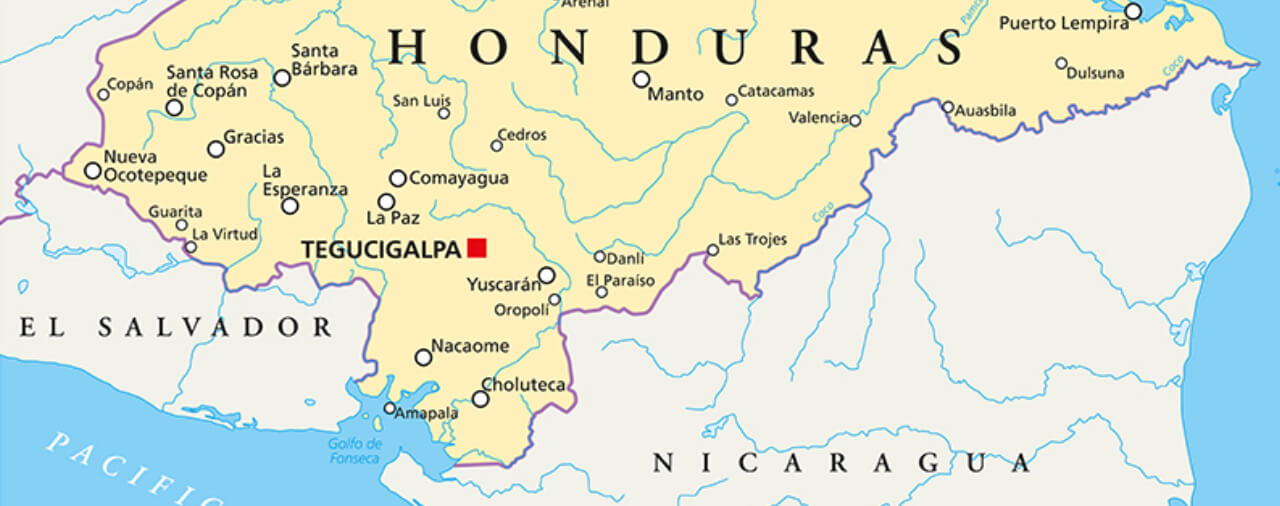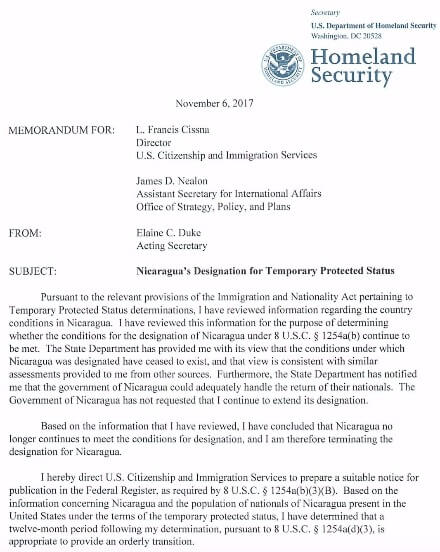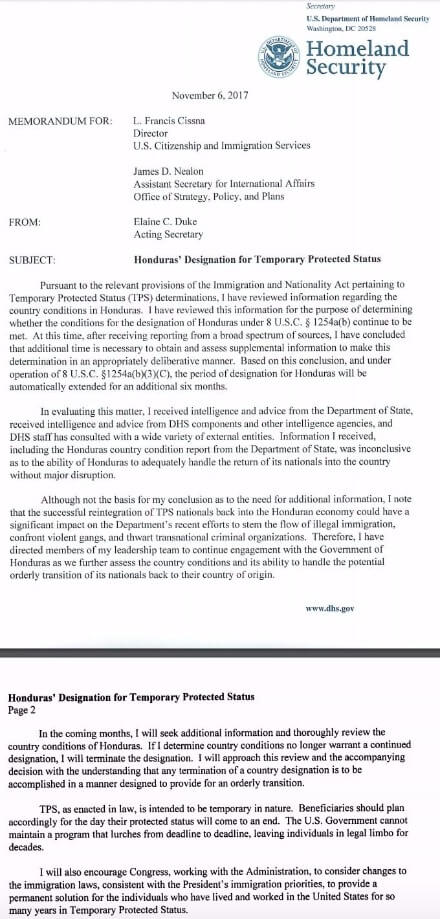DHS Announces Termination of Nicaragua TPS and 6-Month Extension of Honduras TPS

- Introduction
- Termination of TPS for Nicaragua
- Six-Month Extension of TPS for Honduras
- General Notes on TPS from the Honduras Memo
- Conclusion
Introduction
On November 6, 2017, the acting Secretary of Homeland Security Elaine C. Duke made important announcements regarding Temporary Protected Status (TPS) for Nicaragua and Honduras [PDF version]. Acting Secretary Duke announced that the TPS designation for Nicaragua, which had been first made on January 5, 1999, due to the effects of Hurricane Mitch, will be terminated. However, the TPS designation for Honduras will be automatically extended for six months while the DHS further considers whether it should continue to be designated for TPS. Honduras was also designated for TPS on January 5, 1999, due to the effects of Hurricane Mitch. We will review the memoranda for both countries and discuss what the announcement will mean going forward.
Termination of TPS for Nicaragua
The following is the one-page memorandum issued by acting Secretary Duke on her decision to terminate the TPS designation for Nicaragua:
[Click image to view full size]
The decision to terminate TPS for Nicaragua was based on the determination that the circumstances that necessitated TPS for Nicaragua no longer exist. Acting Secretary of Duke noted that the U.S. Department of State (DOS) had informed her that Nicaragua can adequately handle the return of its nationals. Furthermore, the government of Nicaragua did not request that the TPS designation for Nicaragua be extended. Accordingly, acting Secretary Duke determined that the TPS designation for Nicaragua should be terminated. However, in order to ensure an orderly transition, acting Secretary Duke determined that TPS for Nicaragua should remain active for twelve months after her determination. This means that TPS for Nicaragua will terminate on January 5, 2019.
Beneficiaries of TPS for Nicaragua should use the twelve-month period to organize their affairs. Those with an alternative legal status may remain in the United States on such status provided that it remains valid. Nicaraguan TPS beneficiaries who want to remain in the United States after January 5, 2019, should consult with an experienced immigration attorney immediately for guidance on what status, if any, they may be eligible for. Nicaraguan TPS beneficiaries who have no alternative status or path to procuring such status should prepare to depart the United States by January 5, 2019. More details on re-registering for TPS for the final twelve-month period will be published shortly in the Federal Register.
Reuters reported that there are about 5,300 Nicaraguans on TPS in the United States [PDF version].1
Six-Month Extension of TPS for Honduras
The following is acting Secretary Duke's memorandum on TPS for Honduras:
[Click image to view full size]
Acting Secretary Duke stated in the memo that additional time is needed in order to determine whether the conditions in Honduras continue to support the designation of Honduras for TPS. Specifically, she noted that the information she has received from a variety of sources was ultimately inconclusive. Accordingly, TPS for Honduras was automatically extended for an additional six months. The extension will last until July 5, 2018. Details about re-registering for TPS for Honduras will be published in the Federal Register in short order.
The memo makes clear that the future of TPS for Honduras is uncertain. Acting Secretary Duke noted that she has directed the Department of Homeland Security (DHS) to determine whether the return of Honduran nationals to Honduras would have a positive effect on curbing illegal immigration from Honduras and improving the overall security situation there. This process will include working with the Honduran government to ascertain its ability to handle the return of its nationals. She made clear that if it is determined after further review that Honduras can adequately handle the return of its nationals, its designation for TPS will be terminated.
Although TPS for Honduras may ultimately be extended, beneficiaries of Honduras TPS should plan as if it will not in order to be prepared for all eventualities. Those who desire to remain in the United States beyond the potential termination of TPS for Honduras should meet with an experienced immigration attorney immediately for a consultation on what immigration options, if any, may be available. Those who would return to Honduras after the expiration of TPS for Honduras either by choice or for lack of pathway to a different immigration status should begin to organize their affairs for that possibility.
Reuters reported that there are about 86,000 beneficiaries of TPS for Honduras in the United States, making the fate of Honduras' designation for TPS a significant issue for many Honduran nationals in the United States.2 It is also significant because Honduras was initially designated for TPS in 1999.
General Notes on TPS from the Honduras Memo
In the Honduras memo, acting Secretary Duke made clear that TPS is temporary in nature and is only intended to remain in place for as long as the circumstances that warranted a TPS designation continue to exist. In a statement that could be read as a criticism of how the previous three administrations handled TPS designations, acting Secretary Duke wrote that “[t]he U.S. Government cannot maintain a program that lurches from deadline to deadline, leaving individuals in legal limbo for decades.” This point is pertinent in the cases of Nicaragua and Honduras given how long their TPS designations have been extended.
Acting Secretary Duke concluded with a note that may be encouraging for beneficiaries of TPS for Nicaragua, Honduras, and other countries that have been designated for long periods. To conclude her memo, she encouraged Congress to work to craft legislation in accord with President Donald Trump's immigration priorities “to provide a permanent solution for the individuals who have lived and worked in the United States for so many years in Temporary Protected Status.” TPS beneficiaries should not plan as if any legislative solution will be forthcoming, but should instead plan for the worst given the inherently temporary nature of TPS and the Trump Administration's willingness to critically examine the underlying justification of long-standing TPS designations. However, developments as to potential legislation benefiting those who have been in the United States on TPS for significant periods of time will be worth watching going forward.
Conclusion
As we stated in both sections, beneficiaries of TPS for Nicaragua and Honduras should plan for the worst. Beneficiaries of TPS for Nicaragua should not assume that any solution will be forthcoming that does not exist under the current immigration laws with the termination of TPS for Nicaragua. Beneficiaries of TPS for Honduras should plan for the possibility that the TPS designation for Honduras will be terminated after the six-month extension. Those who are unsure about their situations or who intend to apply for or maintain a separate legal basis for remaining in the United States should consult with an experienced immigration attorney for case-specific guidance. We will continue to update the website with more information on TPS for Nicaragua, Honduras, and other countries, including the much-watched situation involving Haiti [see blog].
To learn more about TPS and related issues, please see our full selection of articles on the subject [see category].
______________________

